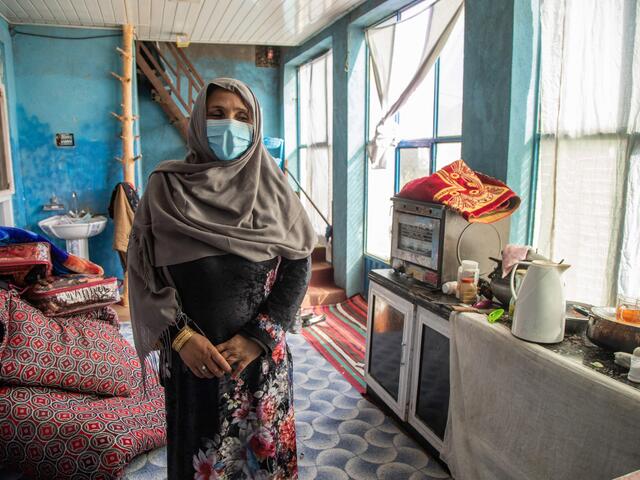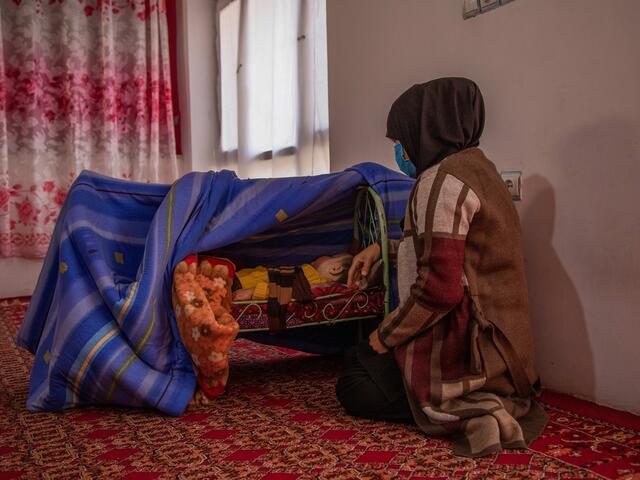
Winter weather in Afghanistan will make it more difficult for people to find food and basic necessities, compounding a decades-long humanitarian crisis worsened by the recent transfer of power in the country.
Twenty-four million people are in urgent need of aid. Women and girls increasingly bear the brunt of violence and of a hunger crisis that threatens to overwhelm the country.
Thanks to the generous help of our supporters, the International Rescue Committee is providing families in Kabul with emergency assistance. This includes direct cash payments that allow families to prepare for the coming winter and purchase what they need most.
In their own words, two Afghan women who fled with their families to Kabul share their stories of hardship and hope.
See the IRC's work in Afghanistan featured on the Dec. 12 episode of 60 Minutes:
Go inside IRC’s work in #Afghanistan—and meet an Afghan mother we’re proud to support—in this @60Minutes clip.
— IRC - International Rescue Committee (@RESCUEorg) December 13, 2021
In their own words, meet two more Afghan mothers and read their stories of hope and hardship, as winter approaches: https://t.co/Abe0ekb8eFhttps://t.co/avgGMG5aSe
Noor,* 38

We had to leave our home because of war. We had no choice. Except for our clothes, we took nothing. Later, I learned that my husband was killed.
Now, winter is coming. Money-wise, we are struggling. And we do not have a breadwinner.
[Before the IRC] I did not have enough money to fill up my gas cylinder. I thank them for whatever they have done for us so far.

Yesterday, I bought two blankets. Today, I want to make a Sandali (a set-up with a wooden table and charcoal that people without a heater use to stay warm in winter) and to get winter clothing. I also want to buy tea and sugar, onions, and things like that we need.
It means that my kids will not starve to death. I can get them medicine if they are sick. And my kids have gotten better now. They will be fine for now.

Right now all I am thinking about is a loaf of bread for them. A shelter. That is enough! But my dream for my children is that they can go to school. They could be successful, not forced to wander around like this.
Zulaykha,* 43

Three months ago, fighting broke out in where I lived. We escaped through mountain valleys and came to Kabul with my three youngest children. My husband stayed behind.
Eventually, I rented a car and drove back, the first woman brave enough to go back there. Everywhere the walls were broken down and the houses were destroyed as well. I searched everywhere but could not find him.
I later learned my husband was killed, and the local people buried him.

I used to conduct human-rights programs, helping people to raise their voices and advocating for women’s rights. Women are most affected by the conditions in Afghanistan. We are the ones who suffer and endure the pain at all times—if there is any problem or hardship, it falls on women all the time in Afghanistan.
At the moment, we have no income. Whatever we had was lost. Here in Kabul, I do not have a salary or other means of income. I cannot even go outside. My kids are too young to work.
If [the IRC] had not helped us, we would have no idea what to do or how to survive. And the help they provided enabled me to buy the most essential items for winter. I stockpiled coal and wood, and bought mattresses and blankets. The remaining money that I have not spent will be used for my one-year-old baby.

Thank you for helping us when we need it the most. If we get a little help from everyone, we can survive.
I want a free Afghanistan and my wish is for a good life for my kids. I had to endure. That is okay, but I want a better future for my children.
How cash assistance helps
Cash assistance gives people the power to buy what they need most and support local markets and economies in the process. This aid is especially important now as more than half of all Afghans face hunger and one million children are at risk of dying from malnutrition.

“People are not able to put food on the table and that is very difficult,” says Awesta, an emergency support officer for the IRC’s cash distribution program. “They do not have enough money in their pockets. The food prices are also very high. Everyday, the situation is getting worse.”
With money in their pockets, those in need can begin to have some hope.
“From the moment they receive it, they can buy medicine, or food,” says Awesta. “They can use the money for school and things needed for classes. They are happy with the cash assistance because it helps their families.”
The IRC has delivered aid in Afghanistan for over 30 years, reaching thousands of communities with vital services like emergency cash relief and economic recovery programs. But more support is needed from humanitarian agencies and world leaders to prevent famine and address the ongoing humanitarian crisis in Afghanistan.
“My message for the international community is please do not forget Afghan people,” Awesta says. “Do not forget Afghan children, Afghan women. They need you.”
Donate to support the IRC's work in Afghanistan and around the world.
*All names have been changed for the safety of IRC clients and staff.